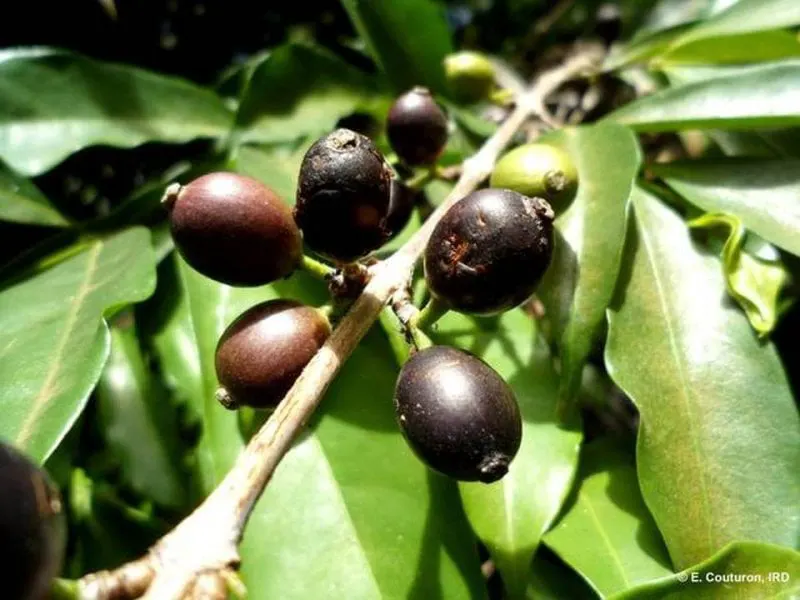‘Future proofing’: Rediscovered wild coffee species could protect against production drops caused by climate change
‘Future proofing’: Rediscovered wild coffee species could protect against production drops caused by climate change


In dense tropical forests in Sierra Leone, scientists have rediscovered a coffee species not seen in the wild in decades.
…
[T]he species, called Coffea stenophylla, possesses greater tolerance for higher temperatures than the Arabica coffee that makes up 56% of global production and the robusta coffee that makes up 43%. The stenophylla coffee, [the researchers] added, was demonstrated to have a superior flavor, similar to Arabica.…
Many farmers throughout the world’s coffee-growing belt already are experiencing climate change’s negative effects, an acute concern for the multibillion dollar industry.
…
The stenophylla rediscovery, [botanist Aaron] Davis said, may help in the “future-proofing” of a coffee industry that supports the economy of several tropical countries and provides livelihoods for more than 100 million farmers. While 124 coffee species are known, Arabica and robusta comprise 99% of consumption.
“The idea is that stenophylla could be used, with minimum domestication, as a high-value coffee for farmers in warmer climates,” said Davis.
Stenophylla had not been seen in the wild in Sierra Leone since 1954 and anywhere since the 1980s in Ivory Coast, Davis said. A few examples were held in coffee research collections.
Davis said stenophylla is threatened with extinction amid large-scale deforestation in the three countries where it has been known to grow in the wild: Sierra Leone, Guinea and Ivory Coast.
Read the original post

 | Videos | More... |

Video: Nuclear energy will destroy us? Global warming is an existential threat? Chemicals are massacring bees? Donate to the Green Industrial Complex!
 | Bees & Pollinators | More... |

GLP podcast: Science journalism is a mess. Here’s how to fix it

Mosquito massacre: Can we safely tackle malaria with a CRISPR gene drive?

Are we facing an ‘Insect Apocalypse’ caused by ‘intensive, industrial’ farming and agricultural chemicals? The media say yes; Science says ‘no’
 | Infographics | More... |

Infographic: Global regulatory and health research agencies on whether glyphosate causes cancer
 | GMO FAQs | More... |

Why is there controversy over GMO foods but not GMO drugs?

How are GMOs labeled around the world?

How does genetic engineering differ from conventional breeding?
 | GLP Profiles | More... |

Alex Jones: Right-wing conspiracy theorist stokes fear of GMOs, pesticides to sell ‘health supplements’




 Trust issues: What happens when therapists use ChatGPT?
Trust issues: What happens when therapists use ChatGPT? Fighting deforestation with CO2: Biotechnology breakthrough creates sustainable palm oil alternative for cosmetics
Fighting deforestation with CO2: Biotechnology breakthrough creates sustainable palm oil alternative for cosmetics California, Washington, Oregon forge immunization alliance to safeguard vaccine access against federal undermining
California, Washington, Oregon forge immunization alliance to safeguard vaccine access against federal undermining Viewpoint — Fact checking MAHA mythmakers: How wellness influencers and RFK, Jr. undermine American science and health
Viewpoint — Fact checking MAHA mythmakers: How wellness influencers and RFK, Jr. undermine American science and health 30-year-old tomato line shows genetic resistance to devastating virus
30-year-old tomato line shows genetic resistance to devastating virus Viewpoint: Video — Big Solar is gobbling up productive agricultural land and hurting farmers yet providing little energy or sustainabilty gains
Viewpoint: Video — Big Solar is gobbling up productive agricultural land and hurting farmers yet providing little energy or sustainabilty gains The free-range chicken dilemma: Better for birds, but with substantial costs
The free-range chicken dilemma: Better for birds, but with substantial costs ‘You have to treat the brain first’: Rethinking chronic pain with Sanjay Gupta
‘You have to treat the brain first’: Rethinking chronic pain with Sanjay Gupta
